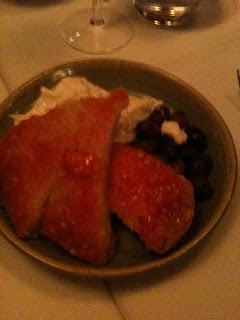Tinello, a new Giorgio Locatelli-backed and inspired offering in Pimlico, is similar. It looks fabulous; the kind of space (hate that word) that makes you feel as if everyone else has missed a trick. It prompts you to ask why all restaurants with pretensions to relaxed, smart quality don’t look like this. Hanging lamps give just enough light per table for vision, creating an illusion of privacy and intimacy, while the bricks and woods of the decor are just really, really, ridiculously good-looking. Too cool for school certainly, but then thank God we’re not at school any more.
Owners and brothers Max and Federico Salli are wine-guy and chef respectively. Their Tuscan heritage is sporadically felt – the menu is a mixed bag of Italian favourites, heavily influenced by Roman, Southern Italian and Marche traditions.
With both Antipasti and ‘Small Eats’ available, it’s slightly tricky to work out what to have for starter. We went for some small eats, and regretted it. Crispy courgette fries were so thin as to lose any remnants of vegetable flavour, instead tasting somewhat of grease and not much else. Polpetto and even Byron do similar dishes better. Burrata with garlicky, tomatoey bread was better, though with nothing to mark it out. Polenta with porcini mushrooms was ok, but under-seasoned and too curd-like in texture for my taste. While I’m sure they were fresh, the porcini were diced so they resembled the sort of thing you find vacuum-packed in Italian supermarkets, ready prepped to be stirred into a risotto. Pickled octopus was beautifully soft and giving, though the pickle all but obliterated any marine flavour. It was a disappointing start, only slightly mitigated by the excellent Prosecco we chose to accompany it, and the fact than no dish cost more than £3.50.
Things improved thereafter. For primi, we went for pasta – mine was nduja sausage and tomato with more burrata over pacchieri pasta (like giant, squat rigatoni). The pasta was perfectly cooked, the sauce intense, hot and tasty. A tagliatelle dish suffered from that odd, diced, textureless porcini, but again, the pasta was excellent. Finally, spinach and ricotta gnudi (a kind of mousse-cum- gnocchi) with tomato were delicious and suitably Tuscan, though extremely rich and almost too generously portioned. At between £7 and £10 each, they were very good value.
My main course was genuinely superb. A whole veal chop, beautifully rare, smothered in butter and accompanied by long-baked fennel and sage, is about as good as food gets in my book. The fat on its own had me smiling for days afterwards. The dish was the high point of the meal, and at £20, it felt like decent value, given the tiny number of places in London that even serve veal chops, let alone cook them like this.
Brill, borlotti beans and clams was good too, though the fish itself was rather overshadowed by the excellence of the accompaniments. Cod on celeriac puree made an unusual but winning combination.
A bottle of Roncaglia Colli Pesaresi at £28 and a young Barbera at £40 both made super accompaniments, and at reasonable prices for the quality.
Three out of four of us went for Pecorino in lieu of dolci. So few Italian restaurants in London manage to serve good pecorino with good honey and figs. In Italy, it’s a favourite. This pecorino was strong and rude enough to delight, while medlar honey provided the perfect, thick accompaniment. Fig jam was fine too, but I only really had eyes for cheese and honey. Cute Letts ordered tiramisu. It was ok, though cream-heavy and marscapone-light. The dessert courses seemed underpriced, if anything: at £5.50, the cheese was the most expensive on the menu.
We accompanied this with grappa (for me), Armagnac, Vecchia Romagna and Disaronno. All proved excellent value and quality (well, as much as you can ever hope for a quality Vecchia Romagna).
It felt like we had really pushed the boat out, so when the bill came in at about £70 per head, it seemed about right. In truth, Tinello costs far less than it might do.
The waiting staff were fun, chatty and knowledgeable, and had no problem with our party staying until about 12.15, three or so hours after we entered. For a meal that started so badly, I feel surprisingly positive about the restaurant, though they should probably confine small eats to the lunch menu or just get rid of them entirely. If it is to be a success, you would think the prices will have to go up, but for now, Tinello is a reasonable option with lots of potential.
Phil Letts’ take: 7/10





















